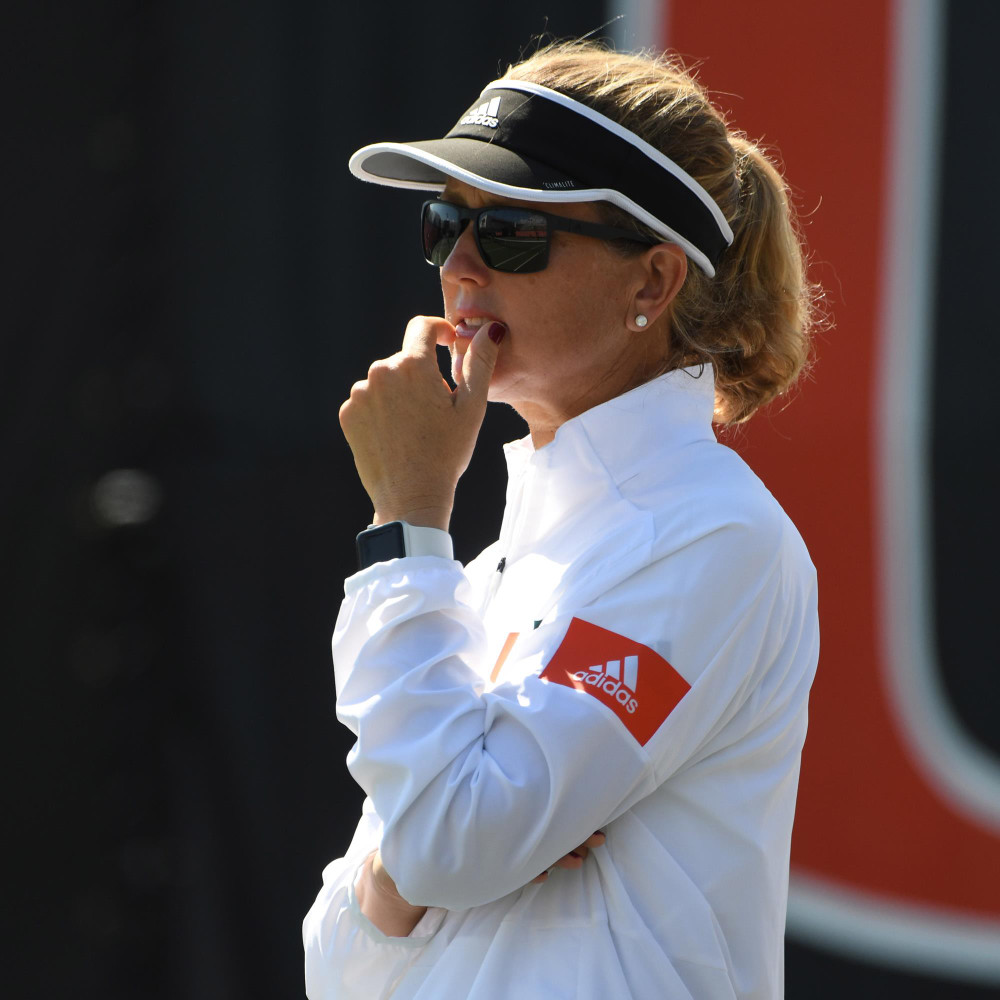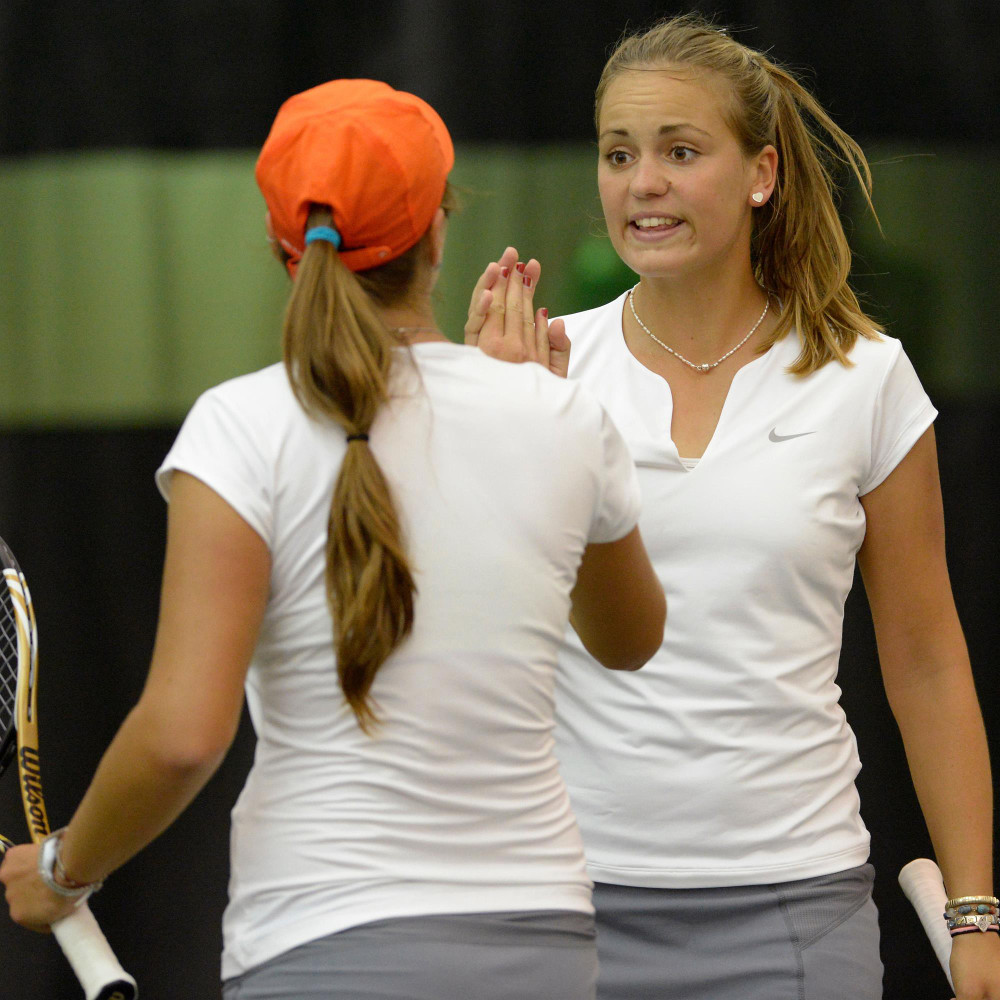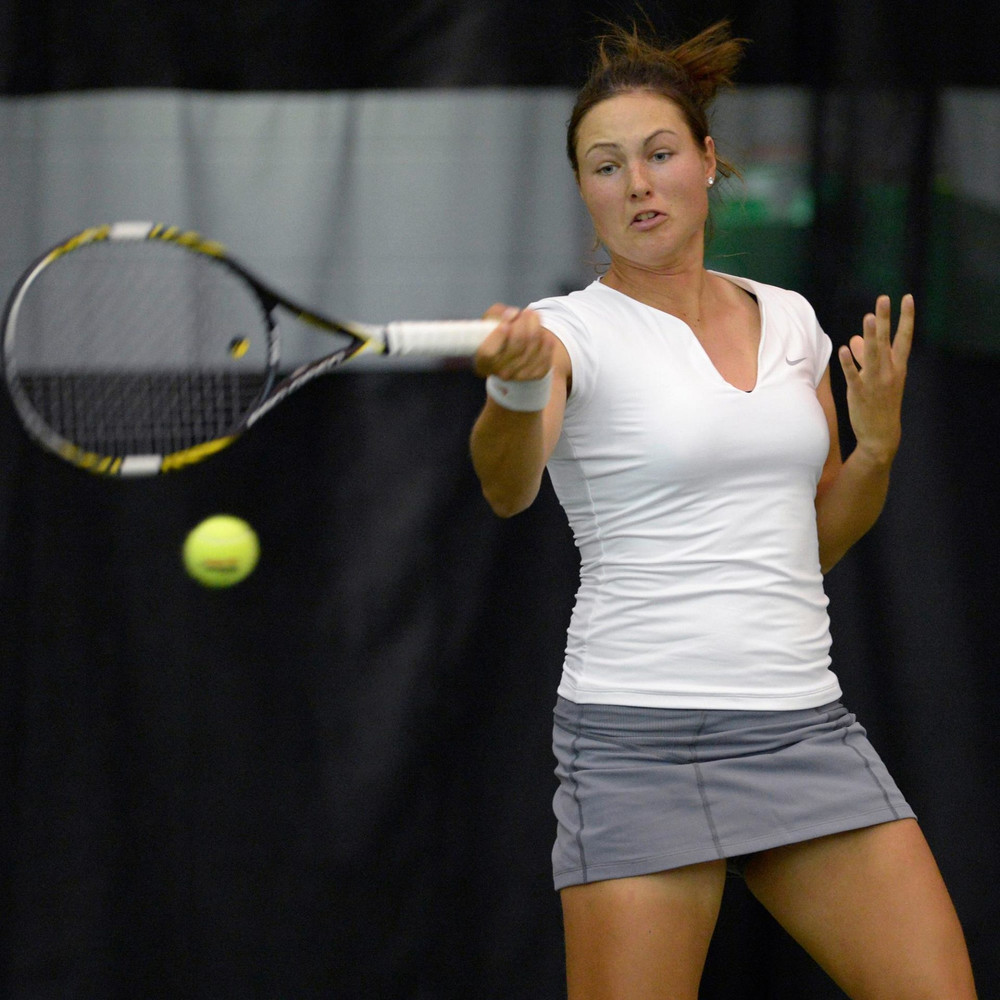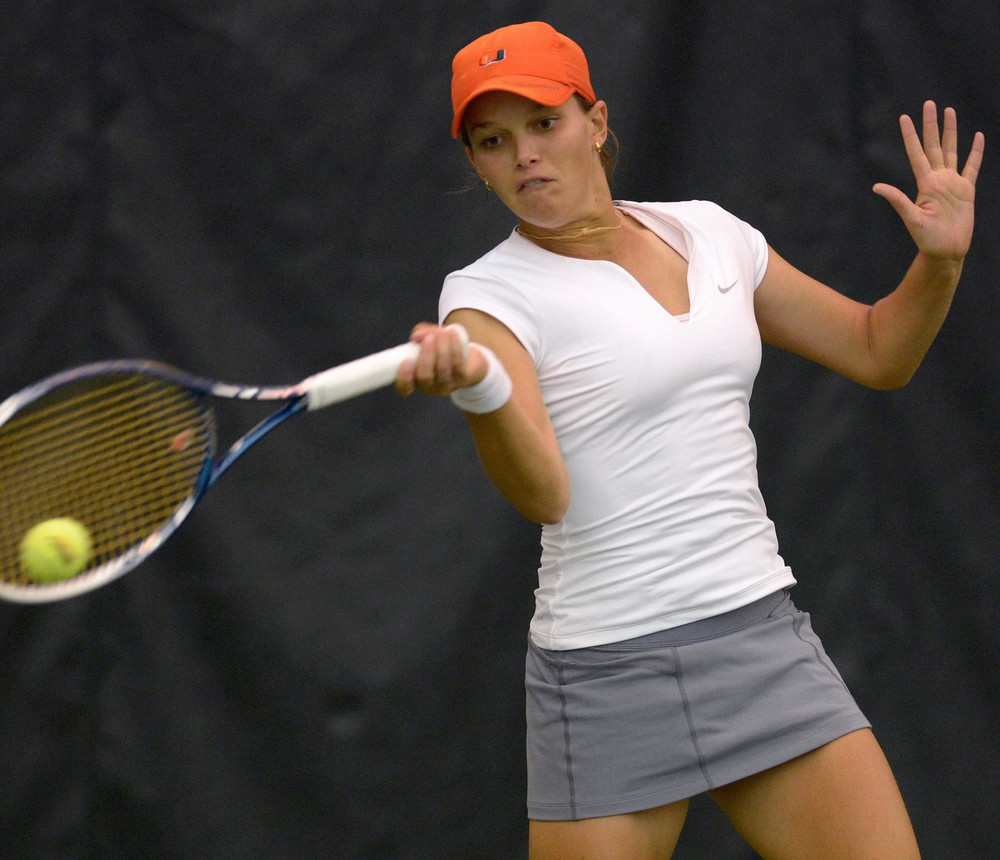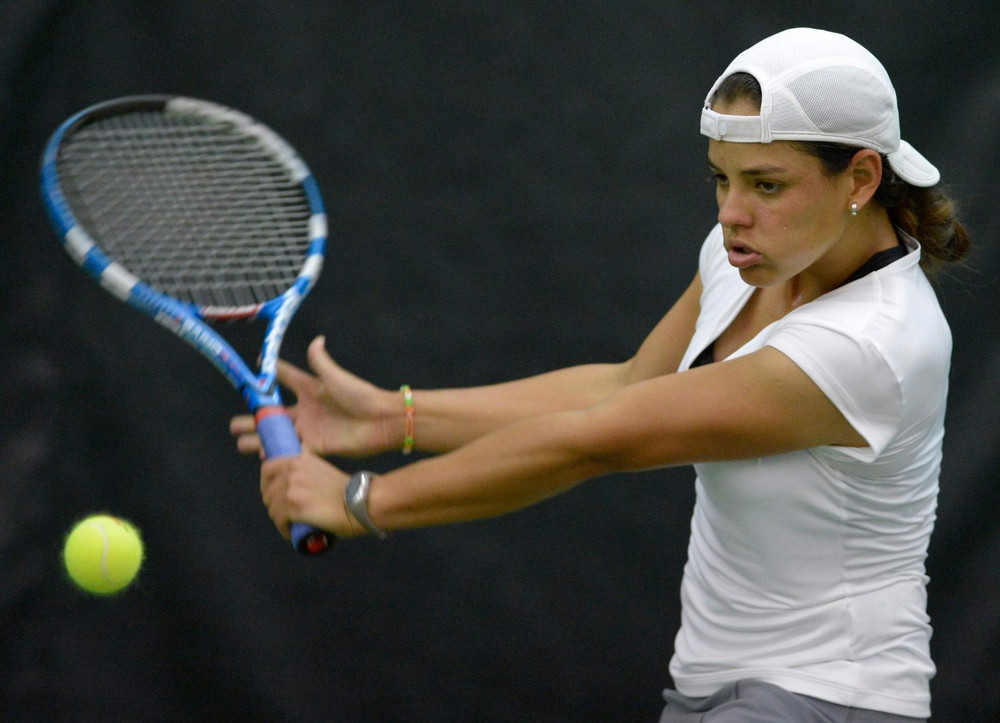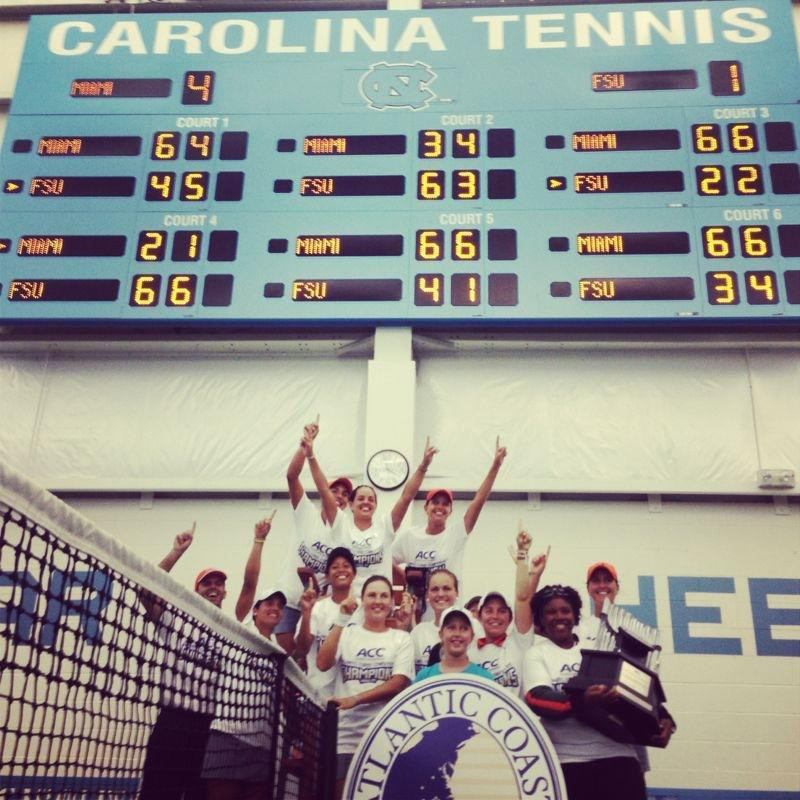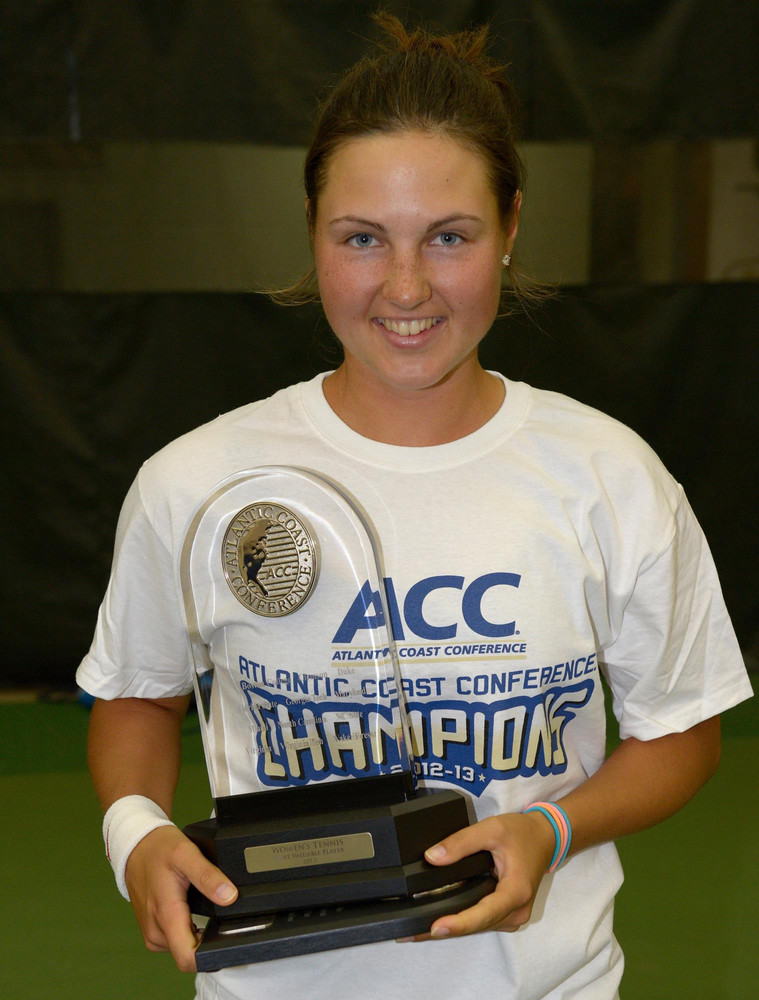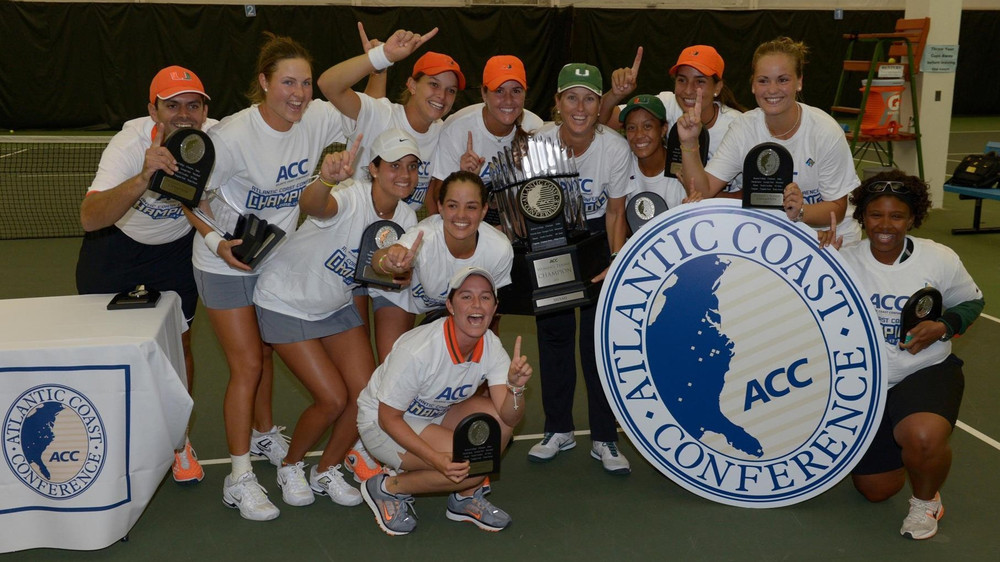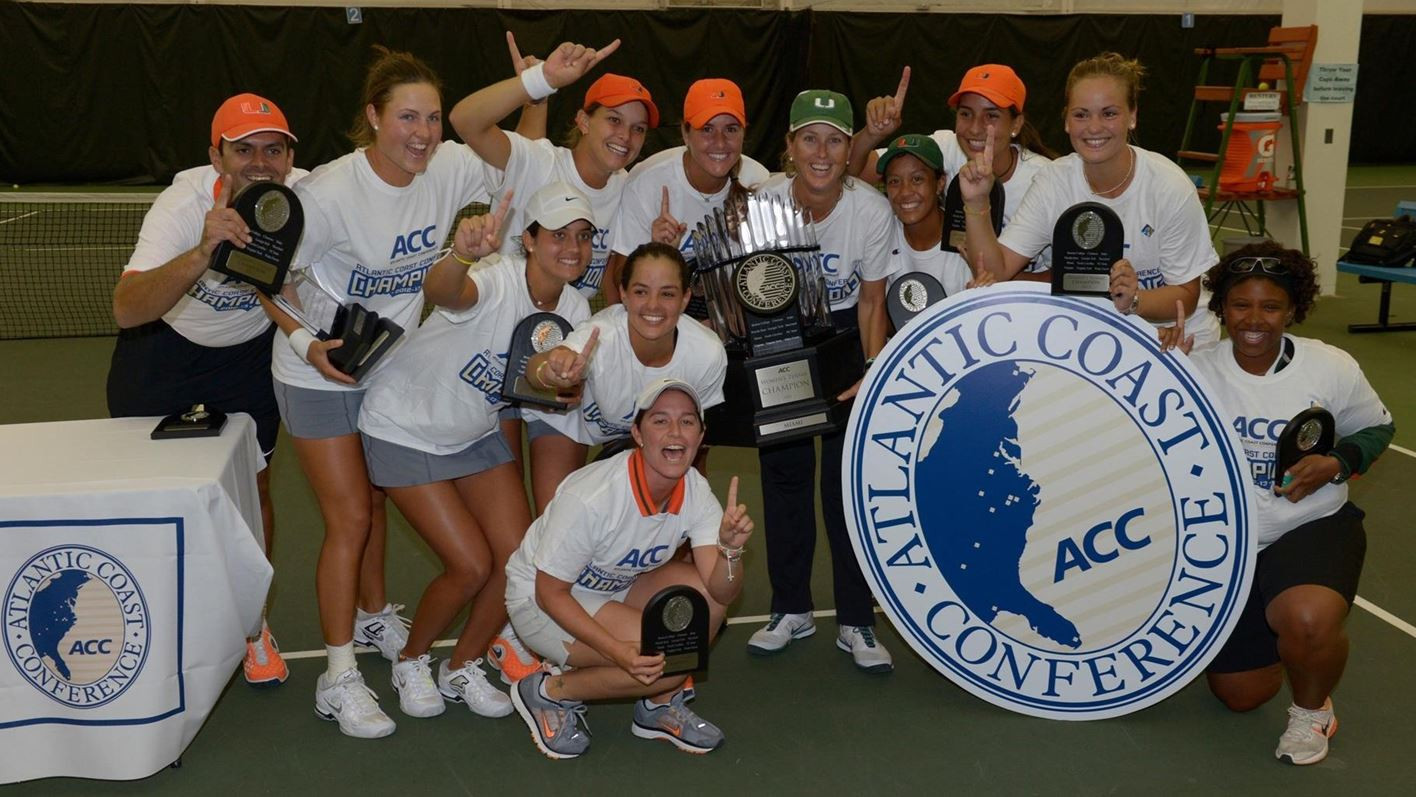
Fifth Time's the Charm
By Alex Schwartz
HurricaneSports.com
CORAL GABLES, Fla. – After winning eight of a possible 13 BIG EAST Championship crowns, the University of Miami women’s tennis team moved to the ACC in 2004-05 and quickly asserted itself as a league powerhouse.
Paige Yaroshuk-Tews, now in her 19th year as head coach and 23rd season with the program, impressively guided Miami to the ACC Championship final in four of its first five years.
The trophy in the nation’s premier conference, however, eluded the Hurricanes in each attempt.
After then missing out on an appearance in the title match for three years, Miami not only got back there in 2013, but finally earned the league’s ultimate prize.
“I remember going into the tournament thinking we’ve got a shot to win it, but when you’ve got competition like UNC and all the competition that we always have around us in the ACC, it’s [difficult],” Yaroshuk-Tews said. “. . . I think our girls just did a great job of playing aggressive tennis, that’s what I really remember. We went after it, we weren’t protecting. We went into the tournament to win the tournament and we didn’t really hold back.”
That set up a semifinal showdown with top-seeded and second-ranked North Carolina, which entered the match at 25-2 after winning eight straight matches, including the last four in shutout fashion.
The Tar Heels already owned a 5-2 win over Miami, just 15 days prior in Coral Gables, Fla. Their lineup featured four top-60 singles players, including the ACC Player of the Year, seventh-ranked Gina Suarez-Malaguti.
“It’s exciting and we have a little rivalry,” then-junior Melissa Bolivar said of playing North Carolina. “They have feisty players, we have feisty players. There’s always a little [emphasis on it]. We always want to beat them because they’re good and matches are close.”
Miami had knocked off the Tar Heels in the NCAA Sweet 16 the prior season, but only two players on the roster, Bolivar and sophomore Lina Lileikite, competed in 2012 and, according to Bolivar, that match was never even mentioned in the lead-up to this iteration of the top-10 rivalry affair.
Our girls just did a great job of playing aggressive tennis, that’s what I really remember. We went after it, we weren’t protecting. We went into the tournament to win the tournament and we didn’t really hold back.
Paige Yaroshuk-Tews
Bolivar and the Hurricanes knew the doubles point would be crucial in pulling off the upset and they got off to a strong start towards earning that tally. Junior Brittany Dubins and freshman Stephanie Wagner tallied an 8-6 victory at the No. 3 spot to get Miami on the board first.
After the Tar Heels pulled even with a 9-8 decision at the No. 1 position, all eyes turned to court two, where Bolivar and freshman Kelsey Laurente were in a must-win contest for the Hurricanes. The duo eventually pulled out a 9-8 victory of its own, giving Miami the early advantage.
“I never hated being the last match. To me, it was fun to be the one who clinched,” Bolivar shared. “Kelsey and I had great chemistry that season and we were playing well. It was just a fun match. It was dynamic, points were short and [it had] a lot of variety. So, it came down to us. We were confident, we were playing well. We win that point and then it gave us a lot of confidence and kind of reassured that we had the tools to win the match.”
Her success in doubles did not extend into singles, though, as Bolivar dropped a 2-6, 2-6 decision at the No. 6 spot, evening the ledger at 1-1. Sophomore Clementina Riobueno put Miami back on top with a 6-4, 6-4 win over No. 56 Caroline Price at the No. 4 position. North Carolina then tied it up again with a straight-set victory at the No. 5 spot.
All three remaining matches were in third sets, but it was Lileikite’s contest on court three that stood out as especially vital.
“We had this talk with Paige before the tournament. I had some [patches of a] rough season before and she mentioned before this ACC tournament that if ‘Lina wins all the matches, we’ll win the tournament title,’” Lileikite said. “So, we were joking around about it with the girls like, ‘Hey, no pressure, Lina!’ But then I had to take it one match at a time and I actually performed really well.”
Lileikite was also coming off an ankle injury that kept her out of the loss to Virginia and the prior matchup, a victory at Virginia Tech. Yaroshuk-Tews knew, however, that the Liepaja, Latvia, native was imperative to the team’s success.
“Just looking at the way matches were shaking out at that moment, I knew Lina was kind of struggling a little bit and, honestly, it was a little bit of applying pressure to Lina,” Yaroshuk-Tews said. “I wanted Lina to recognize the important role that she had . . . I said that in front of the team because I wanted the team to know that and I wanted Lina to know that, that was her job.”
Lileikite delivered.
She logged a 6-3, 5-7, 6-4 upset triumph over No. 36 Whitney Kay to give Miami the lead once again. It did not last long, though, as Suarez-Malaguti rallied from a first-set loss to knock off No. 60 Wagner and level the score for a third time.
It came down to No. 91 Laurente and she, too, delivered for her team, sealing a 5-7, 6-3, 6-4 defeat of No. 44 Zoe De Bruycker. Her forehand volley at match point gave Miami its third win over a vaunted top-60 Tar Heel and clinched the 4-3 victory.
She mentioned before this ACC tournament that if ‘Lina wins all the matches, we’ll win the tournament title.
Lina Lileikite
Meanwhile, in the other semifinal, seventh-seeded and No. 30-ranked Florida State continued its Cinderella run, knocking off its second top-three seed in as many days, taking down Virginia to make it a Sunshine State title match.
“As a coach, I felt like, after we beat Carolina that if we don’t win it, we’ve really laid an egg,” Yaroshuk-Tews said. “You can’t go into a tournament and beat Carolina, that year specifically, and then lose to FSU. You’re dropping your level [if you do that].”
Yaroshuk-Tews, the 2013 ITA Southeast Region Coach of the Year, was certainly not the only Hurricane who felt that way.
“That UNC match, when Kelsey clinched, and then we saw that we played FSU, in our minds—or, I guess, in my mind—the UNC match was kind of more like a championship in terms of the challenge of the physical and emotional [aspect],” Lileikite said.
Further proof that it was not just in Lileikite’s own mind, was Bolivar’s recollection: “To me, we won that championship the day before when we beat UNC.”
Despite all Miami’s confidence and its then 28-5 lead in the all-time series, it had lost to the Seminoles at home for the first time ever nearly two months prior.
The loss to Florida State, much like the one to North Carolina, was not something the team harped on, though. Yaroshuk-Tews noted she even thinks teams that lost a regular season meeting have an edge come a postseason rematch.
Another reason this contest was also different was that Lileikite did not play singles in the first affair, a 4-3 setback on Feb. 22 that concluded a three-match losing streak. She was withheld for what Yaroshuk-Tews remembers as simply “a hiccup” and, by no means, a major issue.
“At that moment when she was held out, she was just, personally, not ready to play,” Yaroshuk-Tews said. “If she’s not ready to play, for whatever reason, I’m going to give somebody else a shot to play. Obviously, Lina deserved to be in the lineup, so she got herself together and she was back in there.”
Despite Lileikite’s absence, Miami nearly beat the Seminoles in the first meeting, but unlike in her strong finish against the Tar Heels, Laurente’s 5-2 third-set lead in the decisive match turned into a tiebreaker defeat and jubilation for the visitors.
To me, we won that championship the day before when we beat UNC.
Melissa Bolivar
With Lileikite, the predetermined key piece to Miami’s championship run, back in the fold, the Hurricanes entered the ACC final as the favorite. However, another obstacle awaited.
Due to weather, the championship match was moved to the Cone-Kenfield Tennis Center in Chapel Hill, N.C., shortly after it started and the Hurricanes, who rarely practice indoors, had to deal with new elements.
“We definitely took down, I think, the stronger team in the semifinals, but then having to go to UNC and play indoors and kind of get it done the way [we needed to was another test],” Yaroshuk-Tews said. “Indoors isn’t, obviously, where we’ve played our best tennis. And then we were playing in a venue that was like a three and three, so the three don’t know what’s going on, [on the other side]. It was just a weird match. It wasn’t your typical Cary, North Carolina, ACC match with a ton of fans cheering against you, type of thing.”
Miami got off to a fast start, though, Bolivar and Laurente logged an 8-5 win at the No. 2 doubles spot to begin the match. Riobueno and sophomore Monique Albuquerque then picked up an 8-5 victory of their own, this one at the top position, to put the Hurricanes in front, 1-0.
Albuquerque opened singles play by doubling Miami’s lead with a 6-4, 6-1 win over Kerrie Cartwright, but the Seminoles answered by slicing the deficit in half behind Amy Sargeant’s straight-set result against Riobueno.
Lileikite proved her value once again, this time giving Miami a lead it would not relinquish after defeating Mia Vriens, 6-2, 6-2.
With Wagner, the 2013 ITA Southeast Region Rookie of the Year, and Laurente both locked in tight matches—the former had a 6-4, 4-5 lead when play eventually stopped, while the latter trailed, 3-6, 4-3—Bolivar felt it was up to her to step up for a clinch once again, this time for an even bigger reward.
“To be honest, I felt that it was me or it was going to be a coin toss,” Bolivar explained. “. . . In my mind I was like, ‘Meli, this is you and don’t let it linger. Don’t let it get to a third set. Don’t let it be up to luck.’ So, that was my mentality.
“The last time we played FSU, Kelsey lost that last match at one and I was super close, too, and I made a few mistakes in that match,” Bolivar continued. “I was playing at four and I lost and then Kelsey lost. If I would have won, I would’ve clinched that match. So, I’m like, ‘Okay, this is not happening again.’”
Yaroshuk-Tews, meanwhile, was more than content with the Barranquilla, Colombia, native in the essential role for the Hurricanes.
“Always felt super comfortable when Meli was in the position to clinch. Always, always,” Yaroshuk-Tews said. “Meli would put that hat backwards and just work. That doesn’t mean that she would clinch them all, but I mean, come on, Meli also clinched . . . [our 2012 NCAA win against] UNC at Georgia at like 2 a.m.”
And clinch, she did.
Bolivar sealed a 6-3, 6-4 decision against Kristina Schleich at the No. 6 position, wrapping up a 4-1 triumph and ending the Seminoles’ hopes of another comeback against their archrival.
With the victory, Miami became just the fifth school to claim the ACC Championship in the 36-year history of the tournament and first, first-time winner since Georgia Tech in 2005, the Hurricanes’ inaugural season in the league.
“I remember going into that match—and I’ve coached a lot of matches in a lot of situations with a lot of teams—and having beat UNC the way we beat UNC the day before, you simply don’t lose to FSU. Period,” Yaroshuk-Tews recalled. “I remember telling the kids, as a team collectively, we don’t walk out of this facility until we’ve put four points on the board . . . I’m always very humble with them and I’m always very focused on just the things that we need to do to win a match, but that day it was, we’re not losing this match.”
I never hated being the last match. To me, it was fun to be the one who clinched.
Melissa Bolivar
Once they had those four points after Bolivar’s clinch, the Hurricanes walked out of the facility with a new addition for the program’s already sizable trophy case.
They did not do so, however, until they completed a well-earned celebration.
“I definitely have a picture in my head of how we all were like jumping around after Meli’s clinch on her court,” Lileikite said. “And then we poured water on Paige’s body. We were all so happy and probably couldn’t even believe what just happened.”
For Yaroshuk-Tews, who never doubted Miami would eventually win a championship, the moment was not nearly as much about her as it was her players.
“I was really happy for the girls because you play in such a tough conference. Losing in the semifinals or the finals of the ACC tournament doesn’t necessarily mean you’re bad or you had an unsuccessful season, but it’s nice just to taste the title,” Yaroshuk-Tews said. “I was just happy that we had our turn, type of thing. I was happy that the girls were able to experience that. I was happy for the hard work that they put in. I was happy that we did it against FSU. I was happy that we did it indoors. I felt like things that weekend—we just played a really solid weekend of tennis. There was no drama.”
Bolivar, who independently used the words “no drama” to describe the Hurricanes that week, recalls the bond the team shared in Cary.
“I think we were relaxed, we were enjoying the tournament” she said. “Obviously if you are winning you enjoy it, but it felt a little different . . . It felt [as though] we were close, we were a team.”
Florida State proved not to be the final team against whom Miami avenged an earlier loss. Three months after a 4-2 setback against Northwestern, the Hurricanes picked up a 4-3 victory over the Wildcats in the NCAA Championship Sweet 16 in Urbana, Ill., to earn their fifth straight Elite Eight appearance and eighth in 10 years.
It was Bolivar, fittingly, who also clinched that massive win, the last one in a 23-6 campaign that ended with Miami ranked eighth nationally, its seventh final top-10 spot in an eight-year span and fifth in a row.
I remember telling the kids, as a team collectively, we don’t walk out of this facility until we’ve put four points on the board.
Paige Yaroshuk-Tews
“We’re all friends, we’re all close and for sure we, once in a while, reminisce on tournaments like [the ACC Championship] or particular wins or whatever stories we have,” Bolivar said of her connection with the 2013 team now. “There’s always [times where] we start talking about something ordinary and we always end up talking about tennis, Paige and the program. And with Paige, she was a mentor for us. So, there’s always that respect that we have for her and admiration. It’s always good to go to the courts, talk to her, look at the girls and see each other again.”
Lileikite, who appropriately won ACC Championship MVP honors after Yaroshuk-Tews’ pre-tournament remarks, added that most of the team is in a WhatsApp group chat and described their bond as “a special relationship.”
Nearly every member—players and staff—of that championship squad still resides in Miami or, in the case of Dubins and Wagner, recently moved to Europe within the past few years.
The group continues to see each other to this day, both the locals and those who live abroad. In fact, when Wagner, now No. 270 in the WTA rankings, last came to Miami, she stayed with Lileikite, who just so happens to live in the same building as Albuquerque.
“These are girls that are going to each other’s weddings. These are girls that are getting together on [Tuesday] nights still at the Schiff Tennis Center and coming out and playing doubles. These are girls that are still going to grab dinner in Brickell. These are girls that are still coming out and watching our team play. That’s why they were good, they were a unit.
“Yes, they were hard-working. Yes, they were tough. Yes, they were resilient,” Yaroshuk-Tews continued. “The one thing that I remember and I still talk about a lot with that group is—so, you don’t see this a lot in tennis—they would be playing singles matches next to one another and let’s say Meli was playing and Lina was playing next to her and Lina would get a bad call on the baseline, Meli would start lighting up Lina’s opponent. That’s the unit that they were.”
We were all so happy and probably couldn’t even believe what just happened.
Lina Lileikite
Yaroshuk-Tews tells her teams to this day about that ACC title and other major moments in Miami’s illustrious history, recognizing the importance of her current players knowing what and who came before them.
In fact, she feels her 2020 squad, which would have been at the ACC Championship this week if its season was not cut short due to the COVID-19 pandemic, was the first one since 2013 to enact that same approach, when warranted, toward a teammate’s opponent.
While that championship victory is still a teaching tool for Yaroshuk-Tews, it is much more than that. It is one of the greatest wins in a dazzling career filled with major triumphs and numerous achievements.
“Winning an ACC title is obviously a big moment,” Yaroshuk-Tews said. “It’s definitely top five.”
It’s fitting, after all, that five is Coach’s number of choice, as the fifth finals berth was the charm for Miami.


